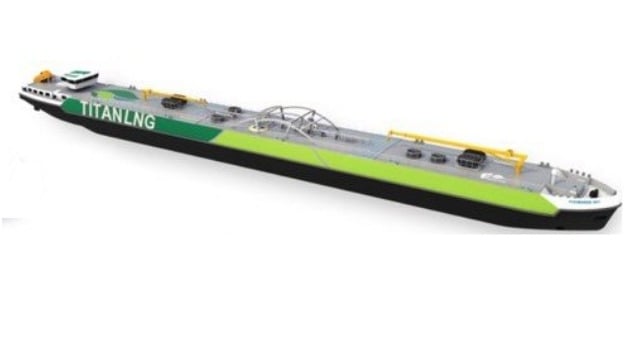EU Funding (Bio)LNG Infrastructure Project

The EU’s Connecting Europe Facility (CEF), a program supporting the development of Europe’s transportation infrastructure, awarded a $12.7 million grant for a (Bio)LNG initiative designed to support the shipping industry’s energy transition and overcome the barriers to scaling up (Bio)LNG as a marine fuel.
The Bio2Bunker project being undertaken by Titan LNG will expand the (Bio)LNG (BLNG) bunkering supply chain in the northern European ports of Zeebrugge, Belgium, Rotterdam, Netherlands, and Lubeck, Germany.
Triton plans to introduce three new bunker barges to service the region. The bunker barges in Belgium and Germany will be similar to Triton’s existing FlexFuelers while for the Amsterdam-Rotterdam-Antwerp region, Triton plans to construct a mothership, the Titan Hyperion that will resupply its FlexFuelers.
In announcing the receipt of the grant, Triton said, “Our customers in the shipping sector are facing a choice for the future. Run on MGO, HFO with scrubbers, or go for (bio)LNG, the only proven alternative fuel that is scalable right now.”
Titan LNG believes that its LNG-fueled ships will be future proof. LNG combined with BLNG and later Synthetic Liquefied Gas (SLG), made by combining green hydrogen and CO2, the company says offer a credible and cost competitive path to decarbonization whilst immediately improving local air quality.
The Connecting Europe Facility (CEF) for Transport, which made the award for this effort, is a program designed to fund European transport infrastructure policy. Its goal is to support investments in building new transport infrastructure in Europe or rehabilitating and upgrading the existing one.
CEF Transport focuses on cross-border projects and projects aiming at removing bottlenecks or bridging missing links in various sections of the Core Network, Europe’s vision of nine multimodal corridors, and the Comprehensive Network, which is designed to facilitate accessibility to all European regions. CEF Transport also supports innovation in the transport system to improve the use of infrastructure, reduce the environmental impact of transport, enhance energy efficiency, and increase safety. CEF Transport's total budget between 2014 and 2020 was nearly $28 billion.
